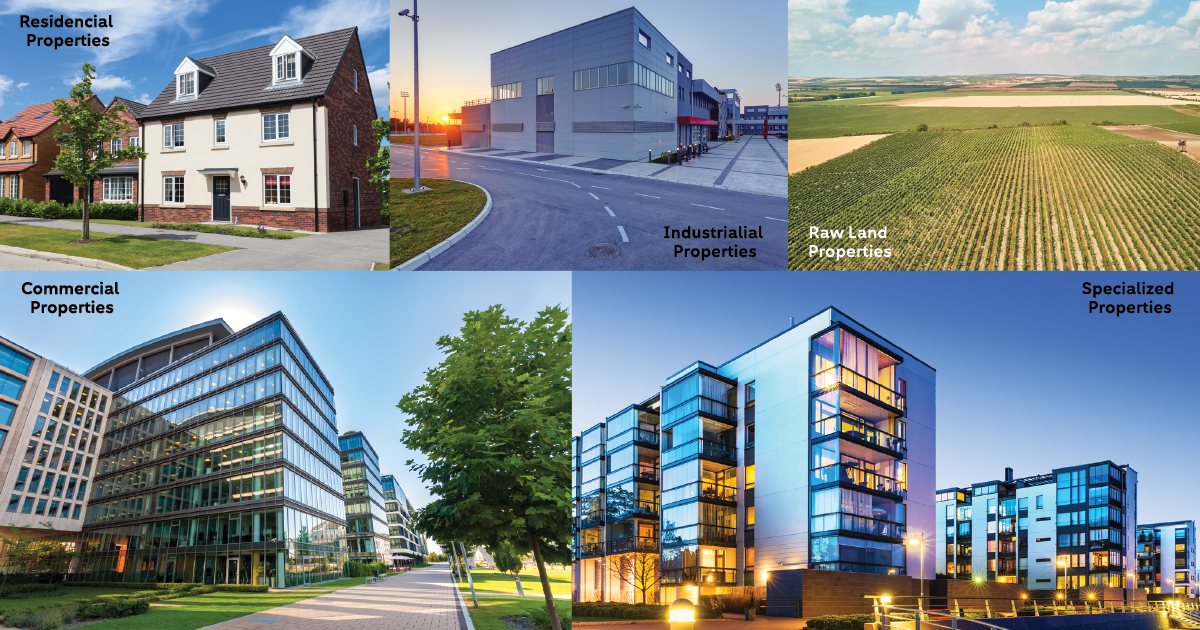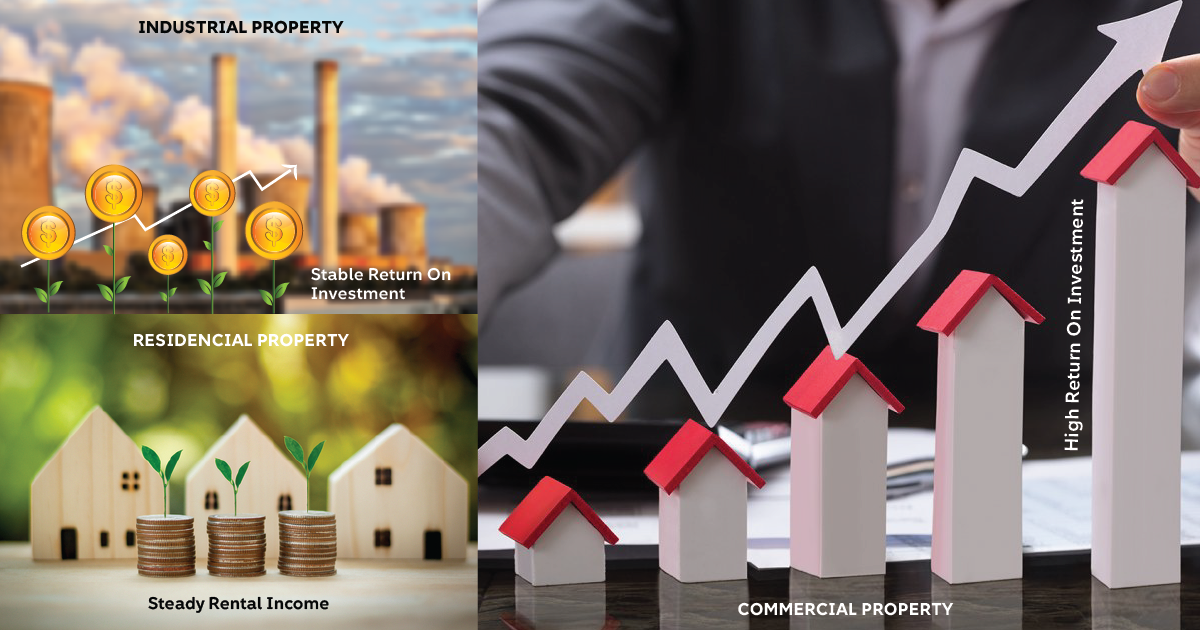Are you considering investing in real estate? Do you want to unlock the investment potential of this industry?
If so, then it's important to understand the different types of properties available to you. From residential to commercial and industrial properties, each type has its unique investment potential.
In this post, we will discuss the various types of properties and their investment potential.
Types of Properties
When it comes to real estate investments, there are several types of properties to consider. Each type of property offers unique advantages and disadvantages, and it's important to understand what they are to make informed investment decisions.

I- Residential Properties
Residential properties are properties that are designed for people to live in. These properties can range from single-family homes to apartment buildings. Residential properties are typically the most popular type of real estate investment because they are in high demand, and their value tends to appreciate over time.
Advantages of Investing in Residential Properties
- Residential properties can provide a long-term investment opportunity with the potential for capital appreciation and rental income over time.
- The demand for residential properties tends to be stable, as people will always need a place to live. This can provide a sense of security for investors.
- Residential properties may offer certain tax benefits, such as deductions for mortgage interest and property taxes, which can reduce the overall tax liability.
Disadvantages of Investing in Residential Properties
- The real estate market can be volatile and subject to fluctuations in demand and pricing, which can make it difficult to predict investment returns.
- Residential properties require ongoing maintenance and repairs, which can be costly and time-consuming for property owners.
- Residential properties can be illiquid, meaning that it may be difficult to sell the property quickly in times of economic hardship or changing market conditions.
II- Commercial Properties
Commercial properties are properties that are designed for businesses to operate in. These properties can include office buildings, retail spaces, and warehouses.
Advantages of Investing in Commercial Properties
- Commercial properties generally have higher rental yields than residential properties, which can provide investors with a higher potential for income.
- Commercial properties often have longer lease agreements than residential properties, which can provide more stability and predictability for investors.
- Commercial properties can appreciate in value over time, providing investors with potential capital gains.
Disadvantages of Investing in Commercial Properties
- Commercial properties generally require a larger initial investment than residential properties, which can make them less accessible to some investors.
- Commercial properties may experience more frequent tenant turnover than residential properties, which can result in longer periods of vacancy and lost rental income.
- Commercial properties often have higher operating costs than residential properties, such as maintenance, utilities, and insurance. These costs can eat into the potential rental income and decrease the overall profitability of the investment.
III- Industrial Properties
Industrial properties are properties that are used for manufacturing or other industrial purposes. These properties can include factories, warehouses, and distribution centers.
Advantages of Investing in Industrial Properties
- Industrial properties can generate higher rental income than residential or commercial properties, especially if they are located in prime areas with high demand.
- Industrial properties often have longer lease agreements than residential or commercial properties, which can provide more stability and predictability for investors.
- There may be less competition in the industrial real estate market compared to the commercial or residential markets, which can create opportunities for investors.
Disadvantages of Investing in Industrial Properties
- Industrial properties often require significant capital investment, such as specialized infrastructure, equipment, and machinery, which can make them expensive to purchase and maintain.
- The market for industrial properties can be limited, as they are often specific to certain industries and locations. This can make it difficult to find suitable tenants or buyers.
- Industrial properties may carry environmental risks, such as contamination or pollution, which can be costly to remediate and may result in legal liabilities for the property owner.

IV- Raw Land Properties
Raw land properties are undeveloped parcels of land. Investing in raw land can offer significant opportunities for appreciation, particularly in areas with rapidly growing populations.
Advantages of Investing in Raw Land Properties
- Raw land properties have the potential to appreciate in value over time, especially if they are located in areas that are undergoing development or experiencing population growth.
- Raw land properties can be used for a variety of purposes, such as residential, commercial, or industrial development, depending on the zoning and local regulations.
- Raw land properties may have a lower initial cost compared to developed properties, which can make them more accessible to investors with limited capital.
Disadvantages of Investing in Raw Land Properties
- Raw land properties do not generate rental income, which means that investors must rely on capital appreciation for returns.
- Developing raw land properties can be risky and expensive, as it often involves navigating complex zoning laws and obtaining necessary permits and approvals.
- The market for raw land properties can be highly volatile, as it is often influenced by factors such as population growth, economic conditions, and government policies. This can make it difficult to predict investment returns.
V- Specialized Properties
Specialized properties are properties that are designed for specific uses. These properties can include hotels, senior living facilities, and healthcare facilities.
Advantages of Investing in Specialized Properties
- Specialized properties, such as medical facilities or data centers, often generate higher rental income due to their specialized nature and the demand for their specific services.
- The market for specialized properties can be less competitive than the broader real estate market, which can create opportunities for investors.
- Specialized properties may have longer lease agreements than other types of properties, providing more stability and predictability for investors.
Disadvantages of Investing in Specialized Properties
- Specialized properties often require a higher initial investment than other types of properties, as they may require specialized infrastructure, equipment, or zoning permits.
- Specialized properties may have a limited market, as they are often specific to certain industries or regions. This can make it difficult to find suitable tenants or buyers.
- Specialized properties may be subject to specific regulations and restrictions that can create additional costs and risks for investors. For example, medical facilities may require compliance with health and safety regulations, while data centers may be subject to cybersecurity regulations.
Key Points
Real estate properties offer various investment opportunities based on their type and classification.
Residential properties are often considered a safe investment option as people always need a place to live. The demand for residential properties remains stable, and the value of the property increases over time. Residential properties also offer a steady rental income, making it a passive income opportunity. However, the rental income is often lower than commercial properties.
Commercial properties offer a higher return on investment compared to residential properties. The rental income is often higher, and the value of the property increases over time. However, commercial properties require significant investment and are often owned by institutional investors. The value of commercial properties depends on their location and the type of business they support.
Industrial properties offer an investment opportunity based on the demand for the type of business they support. Industrial properties are often owned by institutional investors and require a significant investment. However, they offer a stable return on investment.
Ready to Invest
If you're looking to invest in real estate and need help finding potential properties, consider using EasyDigz.
With our advanced system, you can easily search for properties that fit your investment goals and conduct due diligence with our comprehensive property reports. Sign up now and start your real estate investment journey with EasyDigz.







